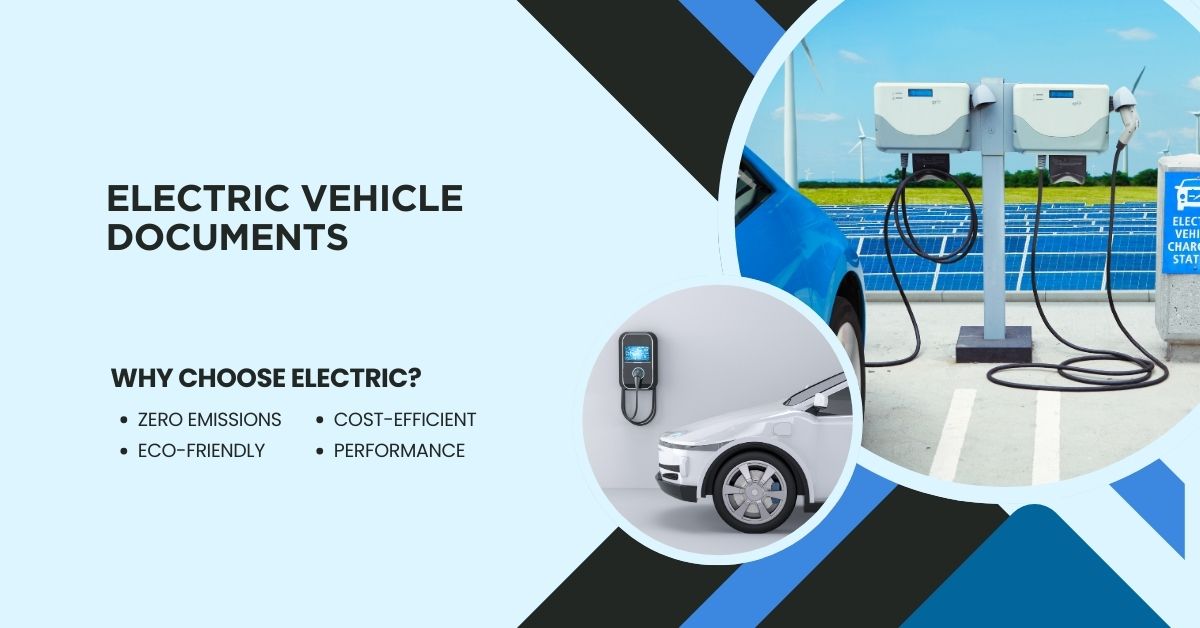Electric Vehicle Documents
Know the details about the Electric Vehicle Documents, Discover essential documents related to electric vehicles with our comprehensive guide. From EV purchase agreements, registration papers, and insurance documents to service manuals and government policy files, we cover everything you need to navigate the world of electric vehicles smoothly.
Whether you’re an EV owner, prospective buyer, or business owner in the EV sector, our resource ensures you’re well-informed and prepared. Learn how to manage, organize, and stay compliant with necessary EV documentation to enhance your ownership or business experience. Simplify your EV journey by understanding the importance and details of these critical documents at your fingertips.
Table of Contents
Electric Vehicle Documents: An Essential Guide for Buyers and Owners
Electric vehicles (EVs) are reshaping the landscape of the automotive industry with their eco-friendly nature, innovative technology, and cost-saving potential. However, just like traditional vehicles, purchasing, registering, and owning an EV requires specific documentation. Understanding these documents can streamline the process and ensure compliance with legal and operational requirements. This comprehensive guide will cover all essential documents associated with electric vehicles, providing clarity and confidence to potential buyers and existing owners.
Purchase and Ownership Documentation
When buying an electric vehicle, it’s vital to keep track of the purchase documents, as these form the foundation for registration, financing, and other legal obligations.

1. Sales Agreement The sales agreement outlines the terms and conditions of the EV purchase, detailing the buyer and seller’s information, the vehicle specifications, and the agreed-upon price. This document serves as proof of ownership and a reference for any disputes or claims.
2. Manufacturer’s Certificate of Origin (MCO) Also known as the Certificate of Origin, the MCO is issued by the manufacturer and provides proof that the vehicle is brand new. It is a critical document for first-time registration and is usually handed over to the buyer by the dealership.
3. Vehicle Invoice The invoice is another crucial document that itemizes the total cost of the vehicle, including the base price, taxes, and any additional fees or add-ons. This document is important for insurance and taxation purposes.
4. Financing Agreement (if applicable) If the EV purchase is financed, the financing agreement outlines the terms between the buyer and the lender, including the loan amount, interest rate, monthly payments, and the duration of the loan. This document should be carefully reviewed before signing.
Registration and Licensing Documentation
Registering an electric vehicle requires submitting specific documents to the local Department of Motor Vehicles (DMV) or an equivalent authority. The registration process legally authorizes the vehicle to operate on public roads.
1. Vehicle Registration Application This form is typically filled out at the DMV or online and includes the vehicle’s details, the owner’s information, and any relevant supporting documents. Registration allows authorities to track vehicle ownership and usage.
2. Proof of Identity and Residence Owners must present proof of identity, such as a driver’s license, passport, or government-issued ID, along with proof of residence like a utility bill or lease agreement. This ensures that the vehicle is registered in the correct jurisdiction.
3. Proof of Insurance Most regions require proof of insurance as part of the registration process. An insurance policy must cover the vehicle to ensure protection against accidents, theft, or damage.
4. Emissions Exemption Certificate Many areas mandate emission tests for vehicles, but electric vehicles are often exempt due to their zero-emission nature. Some jurisdictions may provide an exemption certificate that must be kept as part of the registration paperwork.
5. License Plates and Tags Once registration is complete, the vehicle is assigned a license plate and, in some cases, special tags indicating that it is an EV. These tags can grant benefits like access to carpool lanes or special parking zones.
Insurance-Related Documents
Insurance is crucial for protecting your investment and covering liability in case of accidents or damages. Here are the key documents related to insuring an electric vehicle:

1. Insurance Policy Document The policy outlines the coverage, premium amount, deductibles, and specific terms and conditions. For EVs, it’s wise to choose a policy that includes coverage for battery replacement and charging infrastructure.
2. Insurance Certificate This is a condensed version of the insurance policy, providing proof that the vehicle is insured. The certificate is often needed for registration and must be carried in the vehicle at all times.
3. Claim Documentation If an insurance claim is necessary, maintaining records of the incident report, photographs, and communication with the insurer is essential for a smooth claims process.
Maintenance and Warranty Documents
Electric vehicles are generally more straightforward to maintain than their gasoline counterparts. However, keeping track of maintenance records and warranty documentation is essential for preserving the vehicle’s value and ensuring warranty coverage.
1. Maintenance Records These records detail service history, including battery health checks, tire rotations, software updates, and other routine maintenance. Proper documentation ensures that the vehicle’s condition is well-documented, which is beneficial for resale value and warranty claims.
2. Battery Warranty Most EV manufacturers offer specific warranties for the vehicle’s battery, typically ranging from 8 to 10 years or a certain mileage (e.g., 100,000 miles). This document is vital for claiming battery repairs or replacements if needed.
3. Manufacturer’s Warranty This comprehensive warranty covers the vehicle’s various components, typically for a shorter duration than the battery warranty. It’s important to understand the terms and the exclusions to make informed service decisions.
Incentives and Tax Credit Documents
Governments worldwide offer various incentives to encourage the adoption of electric vehicles. To claim these benefits, specific documentation is needed:
1. Rebate Application Forms Local and federal programs may require an application to receive rebates or incentives. This form usually needs the vehicle invoice and registration details.
2. Tax Credit Documentation Many countries offer tax credits for the purchase of an electric vehicle. Buyers should keep all purchase documents and invoices to claim these credits when filing their annual tax returns.
3. Proof of Eligibility for Other Incentives Some regions provide perks like free parking, toll discounts, or access to restricted areas for EV owners. Proof of eligibility documents, such as registration tags or specialized permits, may be required.
Charging Infrastructure Documents
Owning an electric vehicle means understanding the charging process and potentially installing a home charging station.
1. Home Charger Purchase Receipt and Installation Documents If a home charging station is installed, retaining the receipt and installation documents is essential for warranty and insurance purposes.
2. Permits for Charging Installation In many areas, a permit is required to install a Level 2 home charging station. This permit ensures that the installation meets safety and building code standards.
3. Charging Network Memberships Some EV owners choose to subscribe to public charging networks. Documentation related to these memberships can include contract agreements and access cards, which provide information on usage terms and benefits.
Special Permits and Certifications
Depending on the vehicle’s use or the owner’s location, additional permits and certifications may be necessary:
1. High-Occupancy Vehicle (HOV) Lane Permit EVs in some regions qualify for an HOV lane permit, allowing them to use lanes typically reserved for vehicles with multiple passengers. The application and permit need to be stored for reference.
2. Special Parking Permits Certain areas offer designated EV parking spaces equipped with charging points. A parking permit or sticker may be required to use these facilities.
Documentation for Selling an Electric Vehicle
When selling an EV, proper documentation is key to ensuring a smooth transfer of ownership:
1. Transfer of Ownership Form This form, typically issued by the DMV or a similar authority, transfers the vehicle’s title from the seller to the buyer.
2. Original Vehicle Title The title of the vehicle proves ownership and must be signed over to the new owner during the sale.
3. Bill of Sale This document records the terms of the sale, the sale price, and the details of both parties involved in the transaction.
4. Disclosure of Battery Health Since the battery is one of the most critical components of an EV, it’s wise for sellers to provide a recent battery health report. This report builds trust with buyers and can impact the sale price.
Documentation for Importing an Electric Vehicle
For individuals importing an EV from another country, additional documents are necessary:

1. Import Declaration This document declares the vehicle to customs authorities and includes details like the make, model, value, and origin of the vehicle.
2. Compliance Certificate The imported vehicle must meet local environmental and safety regulations. A certificate of compliance is required to prove this.
3. Customs Duty and Tax Receipts Proof of payment for any applicable import duties and taxes must be maintained for registration and ownership.
FAQs About Electric Vehicle Documents
Q1. What are the essential documents needed to purchase an electric vehicle (EV)?
To buy an EV, you typically need documents such as your ID proof, address proof, vehicle insurance policy, proof of payment, and registration certificate (RC). Depending on your country or state, additional documentation may be required.
Q2. What documents do I need for registering an electric vehicle?
For registration, you’ll usually need your ID proof, proof of address, vehicle purchase invoice, insurance documents, Form 20 (application for registration), and a PUC (Pollution Under Control) certificate, if applicable.
Q3. Is an insurance policy different for electric vehicles compared to traditional vehicles?
Yes, while the basic insurance coverage requirements are similar, EV insurance may include special considerations for battery protection and the overall higher cost of EV components.
Q4. What documents are needed to apply for government subsidies or incentives for EVs?
To apply for subsidies, you generally need proof of purchase, vehicle registration, your identity and address proof, and any other specific forms mandated by the local government or authorities providing the subsidy.
Q5. How do I ensure the documents for my EV meet local environmental regulations?
Ensure that your vehicle’s certification meets emissions or eco-friendly standards set by the relevant environmental authority. This may involve certifications from manufacturers and a valid PUC certificate.
Q6. What paperwork is required for EV financing or leasing?
For financing, you’ll need documents such as income proof, bank statements, ID proof, address proof, and any other paperwork the lender requires. For leasing, you may need additional information related to lease agreements and terms.
Q7. Which documents are essential for importing an electric vehicle?
Importing an EV typically requires a bill of lading, a commercial invoice, a customs clearance certificate, compliance certificates, and proof of payment. Local regulations may demand additional paperwork.
Q8. What documents should I keep for routine EV maintenance and servicing?
It’s advisable to keep your service logs, warranty documents, and any repair or maintenance receipts. These documents can help with resale value and assist in any warranty claims.
Q9. What legal documents do EV dealers provide upon purchase?
EV dealers should provide a purchase invoice, vehicle registration certificate (temporary or permanent), owner’s manual, warranty details, and any promotional agreements or subsidy-related documentation.
Q10. What documents do I need to sell my electric vehicle?
To sell an EV, you’ll need the original registration certificate (RC), insurance papers, the PUC certificate, service history records, sales receipt, and any other legal transfer forms required by the local vehicle registration office.
Conclusion
Owning an electric vehicle brings numerous benefits, from lower fuel costs to environmental sustainability. However, understanding and maintaining the required documentation is crucial for a smooth ownership experience. Proper handling of these documents ensures compliance with local laws, enables seamless transactions, and maximizes the advantages of incentives and tax credits. Whether you’re buying, maintaining, or selling an EV, keeping track of these essential documents will save time and reduce stress.
